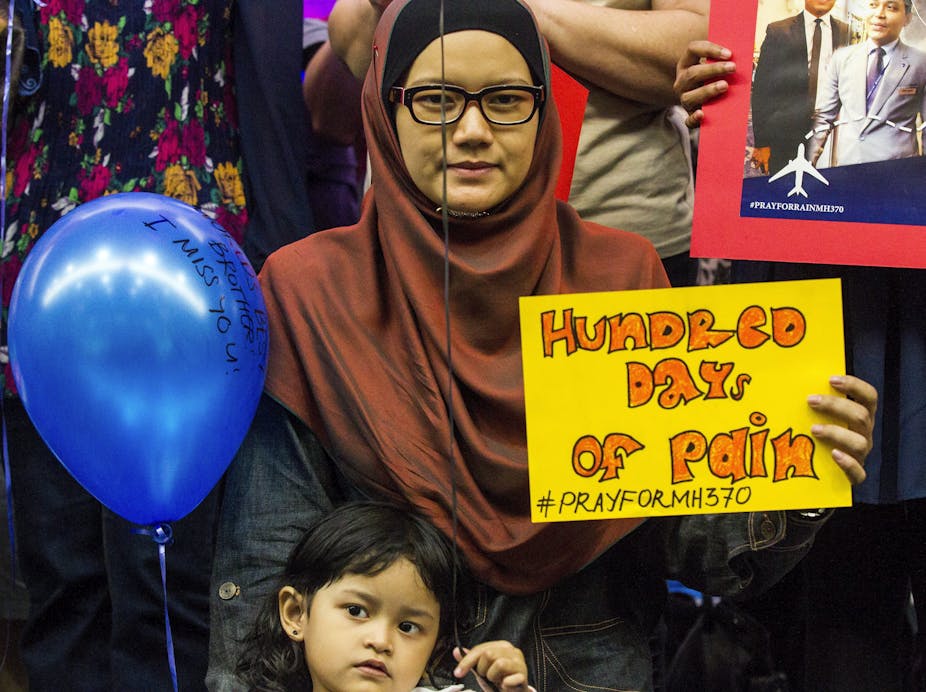More than 100 days on from the disappearance of Malaysia Airlines Flight MH370, the search for the plane continues at a mounting cost for all involved, including the Australian government.
Last month senior ministers from Malaysia, China and Australia met in Canberra and confirmed that the MH370 search would be a “continuous” one, and that it would now be focused on an intensive search “of the ocean floor over a larger area”.
To cover the costs of the ongoing search, the Commonwealth budget makes provision for funding of almost A$90 million to the end of the next financial year. The Commonwealth has also put aside A$60 million for a private contractor to search an area of the Indian Ocean seabed covering 60,000 square kilometres.
The key states in the search for MH370 are Australia, Malaysia and China – Australia because it is the only state proximate to the area in which MH370 is presumed to have ditched (the southern Indian Ocean). Australia is, as a practical matter, the state best equipped to take the lead and conduct the search.
Malaysia is key, of course, because MH370 was operated by Malaysia Airlines and is its state of registration. Malaysia is also responsible for the crash investigation.
China is important because a majority (153) of those passengers on board MH370 (a total of 227, together with 12 crew members) were Chinese; Beijing was MH370’s destination. MH370 also operated as a codeshare flight with China Southern Airlines.
Aviation is known for cooperation
If it wasn’t for international agreements, air travel simply wouldn’t work.
Beginning with the Warsaw Convention of 1929, and ending with the 1999 Montreal Convention, a series of treaties deal with liability for passenger injury or death on board an international flight. These are very successful treaties. Montreal, for example, has to date 107 state parties, and the number increases each year.
Aviation is the most collaborative of industries. States and carriers cooperate and work together, and such cooperation is largely treaty-based. But despite this cooperation, no treaty precisely provides for the search of aircraft in the MH370 context, or for costs associated with such a search.
A chance to forge a new agreement
Last month’s Canberra meeting concluded with steps towards a new agreement between Australia and Malaysia which would include provisions regarding search costs and the financial responsibilities of the parties in that regard.
This is an opportunity to set out a template for future aviation search cooperation for recovery operations in non-territorial ocean waters. No such template exists, and there are advantages to having one – efficiency, effectiveness, and the provision of comfort to next of kin, for example.
Such an international agreement could perhaps include the following outline provisions:
The state most proximate to the area in which an aircraft is lost would control the search and rescue operation and would immediately fund that operation;
the state of registration/owners of the aircraft would be granted special status and consulted regarding the particulars of the search and rescue operation;
all states with nationals on board the aircraft would be apprised of the parameters of the search on an ongoing basis, and would be invited to (send representatives to) monitor that search;
reimbursement of costs incurred by the state controlling the search and rescue operation would be made at periodic intervals during the search (if lengthy) or at its conclusion, with 50% of the costs borne equally by the state controlling the search and rescue operation and the state of registration/aircraft owners, and with the remaining costs borne by states in proportion to the passengers on board;
if it is determined that a state cannot afford its apportioned costs, those costs would be assumed by other states on the above basis; and
the state most proximate to the area in which an aircraft is lost, in consultation with the state of registration/aircraft owner(s), would determine when the search concludes.
Such an agreement in the case of MH370 – and in future cases – might perhaps afford a measure of certainty to relatives and friends of passengers.

